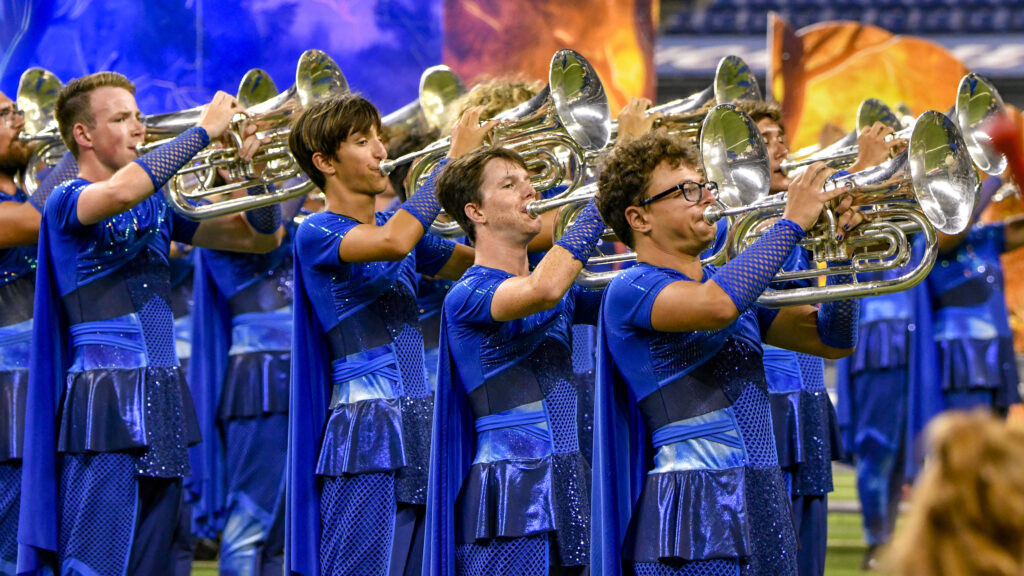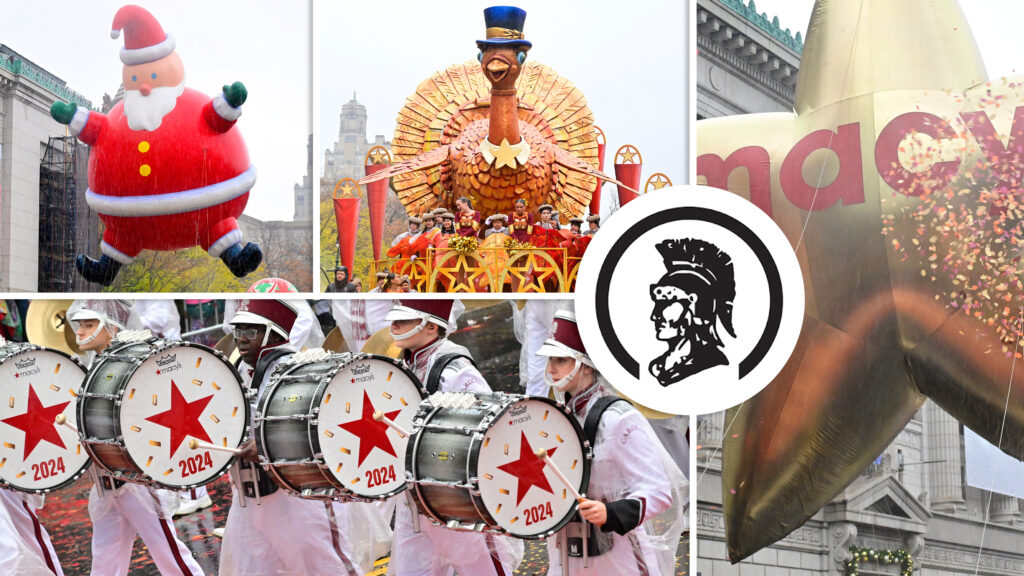Of the groups outside the top-12 at the 2014 Drum Corps International World Championships, perhaps no corps understood the meaning of a tenth of a point more than the Colts, who just missed a finalist position finishing in 13th by that razor slim margin.
Troopers followed in 14th place, topping the 15th-place Blue Devils B, who won the DCI Open Class World Championship title just three days before. The next corps down was The Academy in 16th place, followed by Spirit of Atlanta.
Though finishing in 17th place, Spirit captured 14th in all three music captions on the scoresheets. Its show titled, “Magnolia,” marked an old-fashioned Spirit production that connected with the corps’ geographical down-south roots.
Striking in this production, the corps featured a large prop magnolia tree on the football field. Contrary to some thoughts, however, the tree was simply just a visual element. Instead, the show design meant to pay tribute to the corps’ past while looking toward the future, maintaining the feeling of what Spirit of Atlanta was, is, and will be.
Musically the corps took the field to “Down to the River to Pray,” a traditional American folk gospel hymn with origins in slavery. As the production got underway, color guard members twisted around the prop tree. The females wore flowing southern belle dresses of a pastel bluish green and were adorned with magnolia blossoms in their hair. Accompanying them were the male performers in the same color of shirts and pastel sky-blue pants.
The opener from George Gershwin’s “Porgy and Bess” paid homage to the past, as the corps had featured the 1935 folk opera in its 1984 production. Mallet keyboardists in the front ensemble percussion section kicked things off with a showy xylophone feature from the beginning of the opera’s overture.

After flags of various bright shades popped into view, the opening fanfare segued into “[Leaving for the] Promised Land.” Spirit’s rendition of the song was manically feisty, with lots of show-off horn riffs and a brief mallet and timpani interlude of “It Ain’t Necessarily So” thrown in for good measure.
Ann Ronell, who also provided the “Who’s Afraid of the Big Bad Wolf” lyrics for the 1933 Disney cartoon, “Three Little Pigs,” wrote “Willow Weep for Me” in 1932, inspired by the loveliness of willow trees on the campus of Radcliffe College in Massachusetts. Spirit featured a trumpet and trombone duet at the start of the tune.
Selected for the show to give a glimpse of Spirit’s future, Wynton Marsalis’ blues-based “Jubal Step” is the first movement from the composer’s “All Rise,” a large-scale 100-minute work commissioned by the New York Philharmonic in 1999 that features a full orchestra playing alongside a traditional New Orleans jazz band, a 100-voice chorus, and various ethnic instruments from around the world.
Undulating waves of front ensemble sonorities, rising and falling as the horns moved to the upper right corner of the field, accompanied silvery-blue lamé flags that played off the cloudy blue skies of front sideline sets that hid color guard equipment. Light purple flags emblazoned with silhouettes of a magnolia tree accented a drum interlude, followed by a quirky celebratory horn motif that was more rhythmic than melodic.
American poet and gospel hymnist Annie Hawks wrote “I Need Thee Every Hour” in 1872 with her pastor, Robert Lowry, who supplied the refrain. First appearing in a Baptist collection of original Sunday school songs, the song had been translated into more foreign languages than any other modern hymn at the time of Hawks’ death in 1918. Spirit started the song with a performer singing the lyrics, “I need Thee every hour, Most gracious Lord; No tender voice like Thine, Can peace afford.” By the end of the lyrics, the horn line had gathered around the magnolia tree, paying homage to one of the iconic symbols of the corps’ home region.
A short reference to the opening from the “Porgy and Bess” overture opened the loud, blasting finale of “I Need Thee Every Hour” as sung by Sam Robson, who achieved fame for producing nine-part vocals electronically layered atop each other. The marching brass players contracted into a diagonal block formation of the corps’ delta insignia, the point of the logo directed to the magnolia tree as one of the male color guard members presented a magnolia bloom to a female member to conclude the production.

Michael Boo was a member of the Cavaliers from 1975-1977. He has written about the drum corps activity for more than 35 years and serves as a staff writer for various Drum Corps International projects. Boo has written for numerous other publications and has published an honors-winning book on the history of figure skating. As an accomplished composer, Boo holds a bachelor's degree in music education and a master's degree in music theory and composition. He resides in Chesterton, Indiana.





